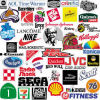 Today’s (not quite) lunchtime post is a collection of news articles about various corporations that have caught my eye:
Today’s (not quite) lunchtime post is a collection of news articles about various corporations that have caught my eye:
- Orchard Supply Hardware. OSH (where my daughter should start working part-time in July) is evidently in reorganization after Sears set them afloat. They’ve just acquired an interesting stalking horse bidder: Lowes, for $250M. Lowes wants OSH because of their large number of stores in California, and evidently they plan to keep OSH’s management in place and the stores open.
- United Air Lines. Interesting news for United Frequent Flyers. United is changing the rules to their Milage Plus program, and adding not only minimum qualifying miles/segments, but a minimum $ amount you must spend. Looks like I’m even less likely to make Premier now (not that I was likely before, given how little corporate travel I do these days).
- Another Man with a Beard is Gone. Mens Wearhouse has fired George Zimmer, the bearded founder and spokesman of the company. Why? George says he has been expressing concerns about the direction of the company to the board, and “the board has inappropriately chosen to silence my concerns by terminating me as an executive officer”. The board? The belief is that they felt Zimmer no longer was appealing to millenials, and were trying to move him to a less active position but “he had difficulty letting go of the reins and the leadership of the business”.
- What You Can Do With a History Degree. Interesting article on a long-closed punk bar near downtown, which has been acquired by the man behind Westside Rentals. The building is behind rehabbed and new apartments will be up for lease. What caught my eye was this tidbit about the man who bought it (who also owns Westside Rentals): “Verge graduated from UCLA in 1990 with a degree in history and has always been drawn to places in Los Angeles that have a good back story.”
P.S.: Debate what you want about global warming and its cause, but weather is getting weird when it reaches 81°F in Anchorage, and 91°F near Mt. McKinley in Alaska!


 The “clearin’ of the links” post seems to be increasingly moving from Friday to Saturday, so let’s just go with it. There is some slight connection between these stories, but not enough to make a full themed article:
The “clearin’ of the links” post seems to be increasingly moving from Friday to Saturday, so let’s just go with it. There is some slight connection between these stories, but not enough to make a full themed article: Well, it’s Friday at lunch, and you know what that means… time to clear out the accumulated links. This week, they are all across the board.
Well, it’s Friday at lunch, and you know what that means… time to clear out the accumulated links. This week, they are all across the board.